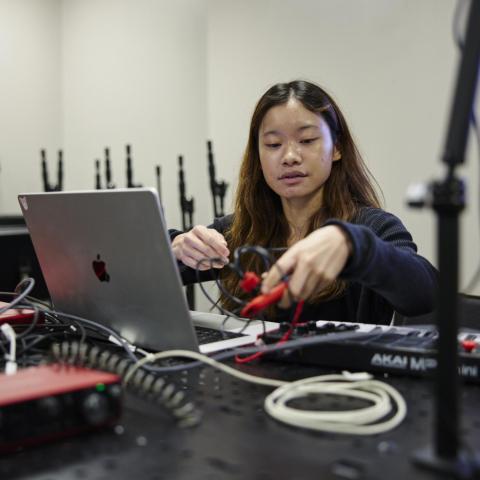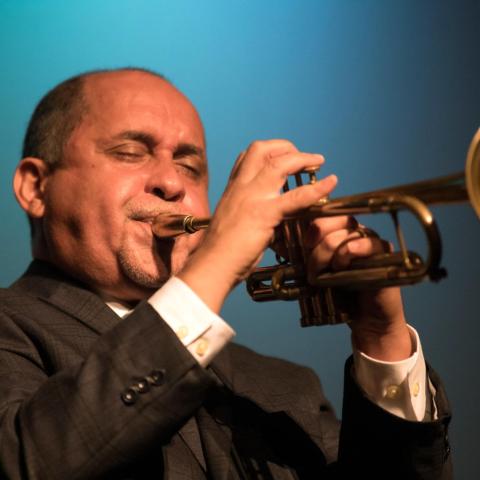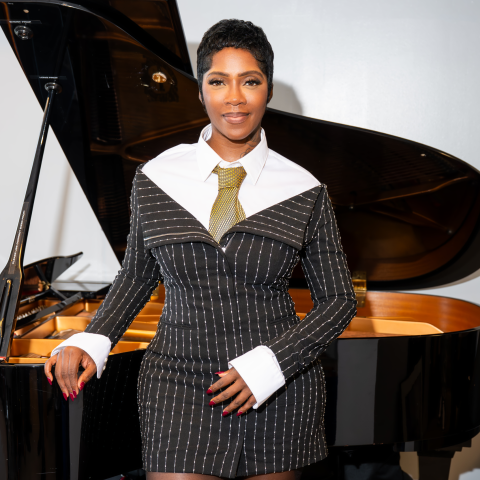How Living Learning Communities Transform the College Experience
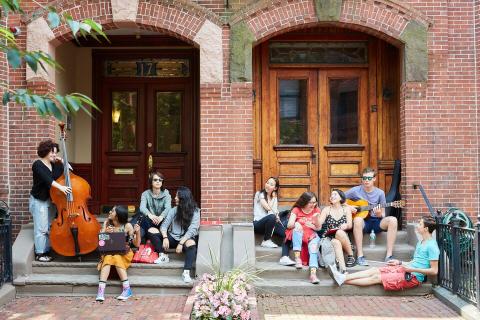
Image by Kelly Davidson
You’d never guess these students just met each other a couple weeks ago. In fact, the way they’re talking about today’s subject—perceptions of disability and musical performance skill—you’d also never guess that this is one of their first college classes. Hands are springing up all over the room. Classmates are responding not only to the questions put forward by their professor, Rhoda Bernard, managing director of the Berklee Institute for Arts Education and Special Needs, but also to each other’s ideas and comments. Their observations are nuanced and carefully explained; contrasting perspectives are hashed out fairly, with an eye toward finding common ground. The discussion is so lively that, after it has run a few minutes beyond the planned transition in the lesson, one student says, “I really want to talk about this, but I know we have to move on.” And Bernard, as any good professor would under the circumstances, lets the student add their final comment to the conversation.
“There’s some really deep thinking going on,” Bernard reflected after the class let out. “I’ve taught that material for a long time—I heard things in class today that I hadn’t heard before."
What Is a Living Learning Community?
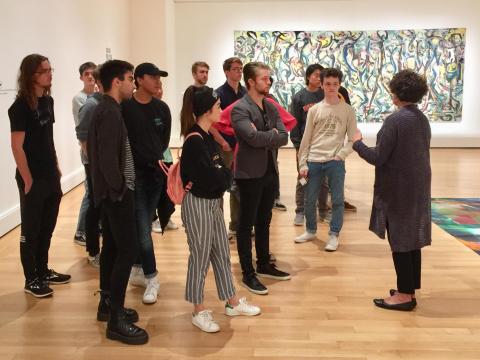
Students in Mark Polanzak's Engaging with Artistic Spaces class on an excursion to the Museum of Fine Arts in Boston.
Of course, there are dozens of factors that make every class different, but one key explanation for the elevated discourse among the first-semester students in Bernard’s Engaging Seminar (LENS) class, Engaging with the Community through Service Learning, is that these students are also members of a living learning community (LLC). They all live together on the same floor in 160 Massachusetts Avenue, every member of this class is here with their roommate, and they have the opportunity to regularly interact with their professor and a student academic mentor outside of class.
Sharing a required first-semester class with floormates is a major advantage for these students, both socially and academically. “The LLC classes form a tight bond early in the semester,” observes Mark Polanzak, an associate professor in the Liberal Arts Department, who teaches an LLC section of the LENS class Engaging with Artistic Spaces. “We go out into the city to discover and analyze unique art experiences, like street performance and busking, as well as traditional resources, such as the museums right down the road from Berklee.”
With LLC classes, Polanzak explains, the learning doesn’t stop when the proverbial bell rings: “They share their ideas in a structured way in class and then can pick up those threads back in the dorm.”
“I value how personal it all seems compared to high school,” says Natalie Del Carmen, a first-year student in Bernard’s class. “I feel as if I learn more with people that I live with.” Her classmate and fellow first-year Giselle Schiller similarly shared how conversations in her LENS class have a way of continuing among those on her floor: “I enjoy all our discussions in class, and I have had them outside of class because of how interesting they are."
Making the Transition
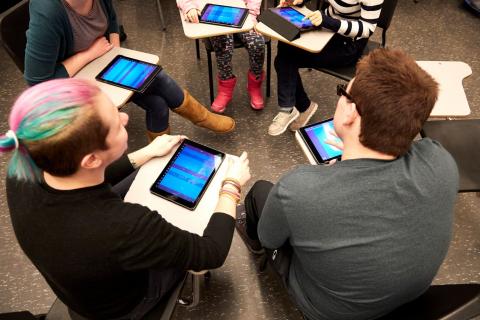
LLCs can also play a crucial role in the transition to college for first-year students at Berklee. “Berklee is a big place with a lot going on, and a lot of students are not accustomed to having a large institution to navigate, to find resources,” explains Bernard. The fact that this support often takes place in more casual settings is an advantage for students who might not yet know where to go for academic or social support. “We had a movie night last week, and we’ll have a TV night this week. I have meals with them, and I make a point of seeing them outside of class and holding an office hour in the dorm, and I’m connected with their student academic mentor and the advising folks. All of this is about supporting them.”
A large part of the support students find in an LLC comes from the social bond built among classmates living and learning together. "LLCs accelerate the rate at which students learn that their peers are the most valuable resources at the college,” says Polanzak. Students become resources for one another not only in the very practical sense ("because you live with your classmates, your roommate will make sure you get to the 9:00 a.m. class even if you slept through the alarm”), but also in establishing a welcoming home base for each other during the transition to college.
"It's incredible to see that the LLC floors of dorms are social hubs,” Polanzak goes on to say. "Everyone on the floor knows each other from class, so they say hello, make plans for social events, and feel comfortable in their dorm space.”
It Helps to Have a Mentor
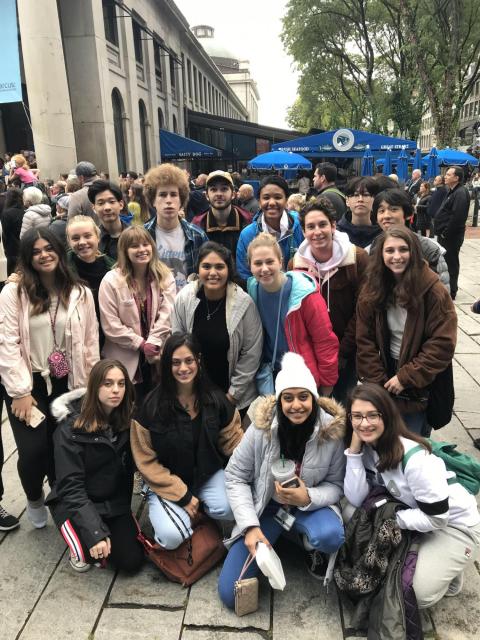
Student academic mentor Idalis Irizarry with her mentees on a field trip to Faneuil Hall in Boston.
“It’s helped me to know the names of my neighbors on my floor,” reflects first-year LLC student Sabrina Murray. But what she values most about the LLC program, Murray says, is “having a student academic mentor nearby. Idalis is incredibly helpful and she interacts with everyone on the floor all the time.”
The student academic mentor lives with the LLC students, and serves as another point of contact helping to integrate their academic and residential lives at Berklee. Idalis Irizarry, a third-year music education major at Berklee, serves as a student academic mentor for Bernard’s Engaging with the Community through Service Learning LLC in the 160 Massachusetts Avenue dormitory. “I try my best to be the best role model I can be for each and every one of my students,” she says. “I also send out weekly newsletters with information about Berklee events and things related to the class they are taking.”
Yet, as with most aspects of the LLC experience, there’s a less formalized, more social aspect to LLC students’ relationship with Irizarry. They go on field trips together. They live together. They make impromptu plans and connections. “I remember brushing my teeth in the bathroom with another one of my mentees during the second week of school, and telling her to audition for the Berklee Musical Theater Club’s production of American Idiot with me. She had no idea about this opportunity, and a week later we ended up both getting cast together in this production.”
Academic. And Social. And Professional.
This is the vision of success for a living learning community: While brushing her teeth, a student learns from her mentor about an audition opportunity. And while walking around Boston on a field trip with their floor, students continue a classroom conversation about what it might be like for a person with a disability to navigate through the city. And while participating in class discussions, students are strengthening social bonds with their roommates and peers, their future colleagues and collaborators. It’s also a major part of the vision for Berklee’s Thrive initiative—a new strategic direction emphasizing student success, affordability, and career preparation as Berklee's top priorities.
"Berklee is a place where these students are building themselves as professionals, and everything they do here is a way for them to grow as professionals,” Bernard says, and she makes sure her students understand this. All the better, then, that LLCs strengthen the connections between academic and social, professional and residential. Because, as she says, “You bring your whole person with you wherever you go."


